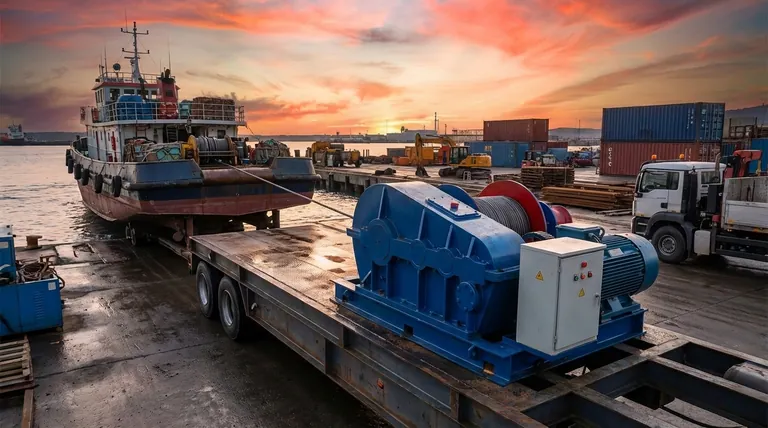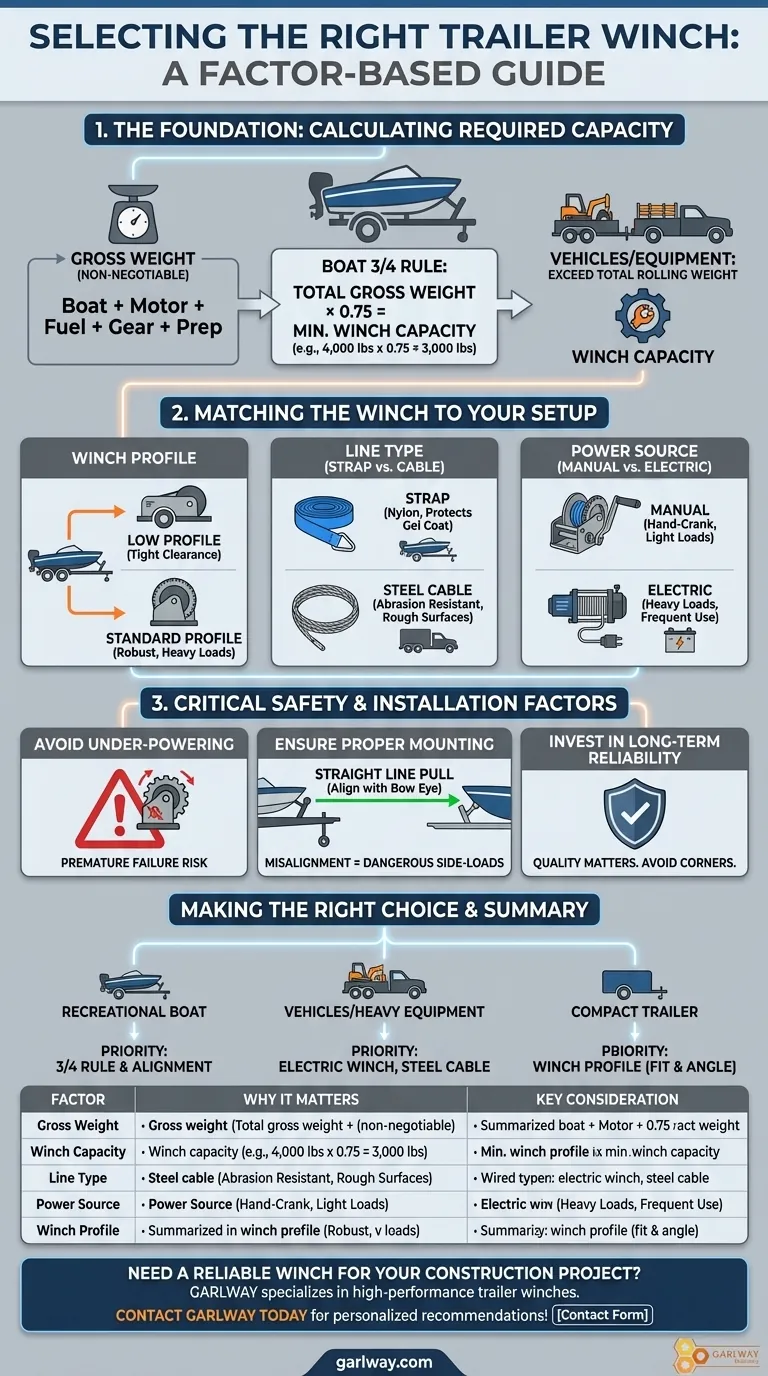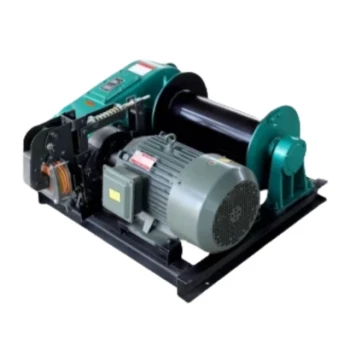Selecting the right trailer winch is a critical decision that directly impacts the safety and efficiency of loading your cargo. The primary factors you must consider are the gross weight of your load, the physical design of your trailer, the type of winch line (strap or cable), and your power source.
The most common and dangerous mistake is choosing a winch based on boat length or an empty trailer's appearance. Your decision must be driven by a conservative calculation of your cargo's total gross weight, ensuring the winch has the proper capacity to handle it safely under real-world conditions.

The Foundation: Calculating Your Required Winch Capacity
Your first and most important step is to determine the correct size and capacity. This is a calculation, not a guess.
Why Gross Weight is Non-Negotiable
The advertised weight of a boat or vehicle is only a starting point. You must calculate the gross weight, which includes the boat or vehicle itself plus the motor, fuel, batteries, gear, and any other items you transport.
This total figure represents the true load the winch will have to pull, especially up the incline of a trailer ramp.
The 3/4 Capacity Rule for Boats
For boat trailers, a reliable industry standard is to select a winch with a capacity rated for at least 3/4 of the total gross weight of your boat package.
For example, if your fully loaded boat, motor, and gear weigh 4,000 lbs, you need a winch rated for a minimum of 3,000 lbs (4,000 x 0.75 = 3,000).
Sizing for Vehicles and Other Cargo
The same principle applies to hauling vehicles or equipment. Determine the full weight of the load you intend to pull and select a winch with a capacity that comfortably exceeds that number to account for friction and incline.
Matching the Winch to Your Trailer and Task
Once you know your required capacity, you can narrow your choice based on the physical constraints of your setup and how you'll use it.
Winch Profile: Low vs. Standard
The physical size of the winch matters, especially on trailers with limited space. A low-profile winch is designed for trailers where clearance is tight. A standard or deep-profile winch is often more robust and suitable for heavier loads where space is not a concern.
Strap vs. Steel Cable
The winch line material is a key consideration. A nylon strap is common for boat trailers, as it's less likely to damage the boat's gel coat.
A steel cable offers superior abrasion resistance and is often preferred for hauling vehicles or equipment where the line may drag across rough surfaces.
Manual vs. Electric Power
A manual (hand-crank) winch is simple, reliable, and requires no external power. It is ideal for lighter loads and users on a budget.
An electric winch does the work for you, making it essential for heavy loads or frequent use. It requires a reliable power source from the tow vehicle's battery.
Understanding the Trade-offs and Safety Factors
A winch is a safety device, and choosing or installing it improperly can lead to equipment damage or serious injury.
The Danger of Under-Powering
Choosing a winch that is too small for your load is the most significant risk. An under-powered winch will strain its gears and motor, leading to premature failure, often at the worst possible moment.
The Critical Role of Proper Mounting
The winch must be mounted so the strap or cable pulls in a straight line from the winch to the cargo's attachment point (like a boat's bow eye).
Any misalignment creates dangerous side-loads on the winch and trailer frame, reducing pulling power and increasing the risk of failure. The height of the winch should align perfectly with the bow eye.
Budget vs. Long-Term Reliability
While budget is always a factor, a winch is not the place to cut corners. Investing in a high-quality unit from a reputable brand ensures it will perform reliably and safely for years.
Making the Right Choice for Your Goal
Your final decision should be guided by your specific application.
- If your primary focus is a standard recreational boat: Prioritize a winch with a capacity rated for at least 3/4 of your boat's fully-loaded gross weight and ensure its height aligns perfectly with your bow eye.
- If your primary focus is hauling vehicles or heavy equipment: Select an electric winch with a durable steel cable, ensuring its capacity comfortably exceeds the rolling weight of your heaviest load.
- If you have a compact trailer with space constraints: Pay close attention to the winch profile (low vs. standard) to ensure it fits without compromising function or creating an unsafe pulling angle.
A properly selected winch provides an essential margin of safety and makes loading your cargo a smooth, predictable process.
Summary Table:
| Key Factor | Why It Matters | Key Consideration |
|---|---|---|
| Gross Weight | Determines required pulling power | Calculate total weight of cargo, fuel, and gear |
| Winch Capacity | Ensures safety and prevents failure | Use the 3/4 rule for boats; exceed weight for vehicles |
| Line Type | Affects durability and cargo protection | Strap for boats; steel cable for rough surfaces |
| Power Source | Impacts ease of use and application | Manual for light loads; Electric for heavy/frequent use |
| Winch Profile | Fits your trailer's physical space | Low-profile for tight clearance; standard for heavy loads |
Need a reliable winch for your construction project?
GARLWAY specializes in high-performance construction machinery, offering durable trailer winches, concrete mixers, and batching plants designed for the demanding needs of construction companies and contractors globally. Our winches are built for safety, efficiency, and long-term reliability, ensuring your cargo is loaded securely every time.
Contact GARLWAY today for a personalized recommendation and discover how our equipment can enhance your operational safety and efficiency!
Visual Guide

Related Products
- Best 18000 Pound Drum Anchor Trailer Winch
- Warn Winch Windlass Boat Trailer Winch
- 12000 lb Electric Boat Trailer Winch with Windlass Anchor Warn
- Electric and Hydraulic Winch for Heavy Duty Applications
- Quick Windlass Portable Winch for Truck and Boat Best Boat Winch
People Also Ask
- What is a hoist and what does it include? A Complete Guide to the Core Lifting Machine
- What is the danger of side pulling when using an electric hoist? Avoid Catastrophic Failure and Ensure Operator Safety
- What are winches for flatbed trailers? Essential for Safe Cargo Securement
- What is the braking mechanism in manual chain hoists? The Simple, Automatic Safety System Explained
- How do hydraulic winches enhance efficiency in cargo handling? Achieve Controlled Power for Safer, Faster Operations
- What is the significance of gear ratios in manual winches? Master the Speed vs. Power Trade-Off
- What are the durability benefits of hydraulic winches? Superior Performance for Heavy-Duty Tasks
- What is the basic function of a winch? A Force Multiplier for Heavy Loads








